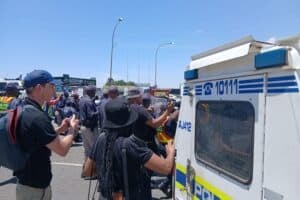The rules for the use of rubber bullets are routinely ignored and Mthokosizi Ntumba's death was just the latest in a long line of police transgressions, the institute says.

Had Mthokosizi Ntumba survived his shooting at close range with rubber bullets, it is likely the police officers involved would have gotten away with ignoring firearm regulations as they are often not held accountable, the Institute for Security Studies (ISS) said.
Four police officers were arrested for allegedly fatally shooting bystander Ntumba during the Wits student protests in Braamfontein, Johannesburg this month.
During their bail hearing this week, it was revealed Ntumba died as a result of being hit in the chest with three rubber bullets shot from a range of about 4m.
ALSO READ: Cops accused of Wits bystander’s murder released on bail
While SAPS directives recommend a firing distance of 20m, there are no clear standards for the use of rubber bullets, the ISS said. The effects of rubber bullets are not effective when standing more than the recommended 20m, ISS researcher Graham Newham said.
“Some of the bullets used are double-balled – you have to be quite close to someone before you can actually hit them.”
The National Instruction 4 of 2014, states rubber bullets should only be used when all other methods to deescalate a situation have failed.
The 2014 national instruction came after the fatal shooting of protester Andries Tatane, who was killed when police fired rubber bullets at close range during a service delivery protest in Ficksburg, Free State.
“The instruction contains many positive features which are in line with international human rights standards related to crowd management,” the Socio-Economic Rights Institute of South Africa (SERI) said.
Their use should be in line with the lawful objective of stopping someone from committing an act of violence to another person or property or from committing a crime and only on command from a superior, Newham said.
“That is the regulatory framework, but we know that hardly ever happens. Police officers seem to shoot at will and don’t differentiate between people in the crowd who are committing acts of violence and bystanders, so they shoot people who are not committing any violence.”
“In the case of Mr Ntumba, there was no reason to shoot him at all. There are examples of protests where police are shooting rubber bullets at peaceful unarmed students who are not committing crimes.”
ALSO READ: Police use of rubber bullets ‘a crime’, says Amnesty International
Mthokosizi Ntumba was killed during #WitsAsinamali protests yesterday.
Mthokozisi Ntumba was working for the Department of Human Settlements. He just got his master’s degree. He was a husband. He was a father of three. He was shot and killed in broad daylight by the SAPS #NSFAS pic.twitter.com/aoSMuMUm14— The_OfficialBiZ ♚ (@The_OfficialBiZ) March 11, 2021
Regulations ignored due to lack of consequences
A SERI report into the 2015-16 Fees Must Fall student protests found that students suffered injuries such as thermal burns to the face, loss of an eye, multiple rubber bullet injuries to single individuals and intentional close-range shots with rubber bullets which led to traumatic injuries.
Regulations are “routinely ignored” as nothing happens to officers who contravene them, Newham said. Only 5% of complaints lodged with the Independent Police Investigation Directive (IPID) result in sanctions against officers, while 1% end up in criminal conviction and 4% in disciplinary conviction.
“That system is largely dysfunctional and not operating properly. The police internal disciplinary system has largely collapsed. Four years ago they were able to hold 4,200 disciplinary hearings a year and for the last three years, they haven’t held more than 1,800.”
“The root problems are still leadership and top management not being held accountable for doing their jobs and therefore no one is held accountable,” Newham said.
ALSO READ: Time for Saps to be held accountable for their murders
For more news your way, download The Citizen’s app for iOS and Android.






